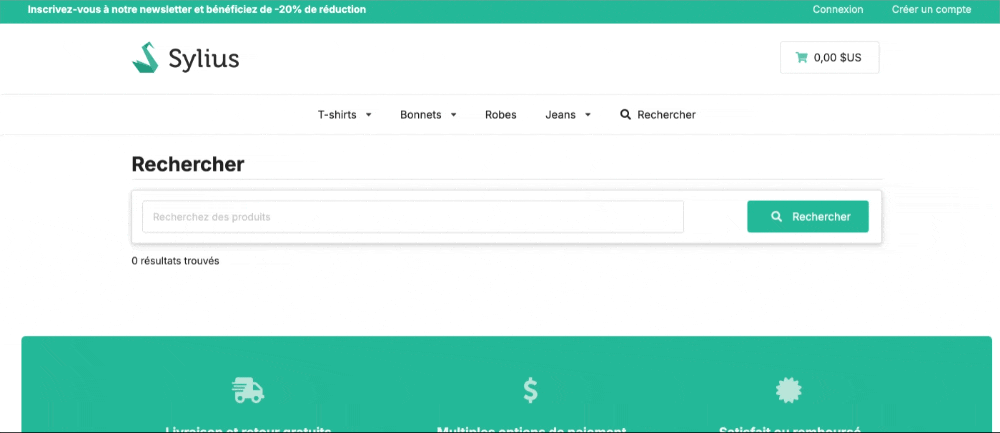acseo / sylius-typesense
Sylius Typesense is a plugin for integrating Typesense, a fast and powerful search engine, with Sylius, an open-source e-commerce platform. This plugin boosts your Sylius store’s search capabilities by leveraging Typesense’s advanced search features, providing fast, relevant search results.
Installs: 841
Dependents: 0
Suggesters: 0
Security: 0
Stars: 0
Watchers: 4
Forks: 1
Open Issues: 0
Type:sylius-plugin
pkg:composer/acseo/sylius-typesense
Requires
- php: ^8.2
- acseo/typesense-bundle: ^0.8.0
- pagerfanta/pagerfanta: ^3.8
- sylius/sylius: >=1.12 <1.14
Requires (Dev)
- friendsofphp/php-cs-fixer: ^3.16
- phpmd/phpmd: ^2.15
- phpspec/phpspec: ^7.0
- phpstan/phpstan: ^1.8.4
- phpstan/phpstan-doctrine: ^1.3.2
- phpstan/phpstan-webmozart-assert: ^1.1
- phpunit/phpunit: ^10.5
README
Sylius Typesense


Introduction
Sylius Typesense is a plugin for integrating Typesense, a fast and powerful search engine, with Sylius, an open-source e-commerce platform. This plugin boosts your Sylius store’s search capabilities by leveraging Typesense’s advanced search features, providing fast, relevant search results.
Features
- Seamless integration with Sylius.
- Automatic indexing of product data.
- Support for a variety of field types (e.g., primary, collection, object).
- Easy-to-use console commands for creating and importing collections.
Installation
Follow these steps to integrate Sylius Typesense into your project:
Step 1: Install the Package
Install the Sylius Typesense plugin using Composer. Run the following command in your terminal:
$ composer require acseo/sylius-typesense
Step 2: Register the Plugin
Once the package is installed, you need to register the plugin in your Symfony application. Open the config/bundles.php file and add the following lines:
return [ ACSEO\TypesenseBundle\ACSEOTypesenseBundle::class => ['all' => true], ACSEO\SyliusTypesense\ACSEOSyliusTypesense::class => ['all' => true], ];
Step 3: Import Required Configuration
Next, import the configuration by adding the service definitions to your config/packages/_sylius.yaml file:
# config/packages/_sylius.yaml imports: - { resource: "@ACSEOSyliusTypesense/Resources/config/services.yaml" }
Step 4: Import Routing Configuration
To make the routes available, you need to import the routing configuration. Add the following lines to your config/routes.yaml file:
# config/routes.yaml sylius_typesense: resource: "@ACSEOSyliusTypesense/Resources/config/routes.yaml"
Step 5: Set Up Typesense with Docker
To run Typesense locally, you can use Docker. Add the following service definition to your docker-compose.yaml file: Add to docker-compose.yaml
services: typesense: image: typesense/typesense:27.1 restart: on-failure ports: - "8108:8108" volumes: - ./typesense-data:/data command: '--data-dir /data --api-key=xyz --enable-cors'
Start the services by running:
$ make down up
Configuration
Step 1: Configure Environment Variables
Add the following configuration to your .env file to set up the Typesense URL and API key:
TYPESENSE_URL=http://localhost:8108 TYPESENSE_KEY=123 PRODUCT_SEARCH_LIMIT=9
Step 2: Plugin Configuration
Next, add the following configuration to your config/packages/acseo_typesense.yaml file:
acseo_typesense: typesense: url: 'http://localhost:8108' key: 'xyz' collection_prefix: 'test_' collections: products: entity: 'App\Entity\Product\Product' fields: id: name: id type: primary sortable_id: entity_attribute: id name: sortable_id type: int32 code: name: code type: string infix: true translations: name: translations type: collection infix: true taxons: name: taxons type: collection infix: true embedding: name: embedding type: float[] embed: from: - translations - taxons - code model_config: model_name: ts/e5-small default_sorting_field: sortable_id symbols_to_index: [ '+' ]
You can use various field types supported by Typesense such as string, int32, float, and others. Types such as primary, collection, and object are also supported.
Step 3: Modify the ProductTranslation Entity
To ensure compatibility with the Typesense plugin, you need to extend the ProductTranslation entity from ACSEO\SyliusTypesense\Entity\Product\ProductTranslation. Modify the ProductTranslation class in your App\Entity\Product namespace like so:
<?php declare(strict_types=1); namespace App\Entity\Product; use Doctrine\ORM\Mapping as ORM; use ACSEO\SyliusTypesense\Entity\Product\ProductTranslation as BaseProductTranslation; /** * @ORM\Entity * @ORM\Table(name="sylius_product_translation") */ #[ORM\Entity] #[ORM\Table(name: 'sylius_product_translation')] class ProductTranslation extends BaseProductTranslation { }
This will allow Sylius Typesense to properly work with your custom product translations.
Step 4: Add Plugin Templates
Copy the plugin templates into your project's template directory. Run the following command:
cp -R vendor/acseo/sylius-typesense/src/Resources/views/bundles/ templates/bundles/
Usage
Create Index and Populate Data
This plugin provides useful commands to create and index your data.
Create collection structure
To create the collection structure, run the following command:
php bin/console typesense:create
Import collections with Doctrine entities
To import collections with your Doctrine entities, use the following command:
php bin/console typesense:import

